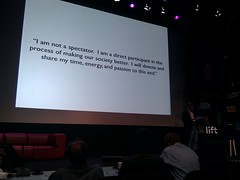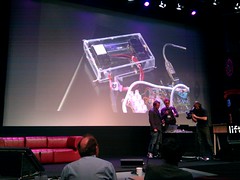LIFT10: Stories
 Yeon-ho Oh, OhMyNews: the story and future of citizen journalism
Yeon-ho Oh, OhMyNews: the story and future of citizen journalism
OhMyNews is direct democracy in media; every citizen is a reporter. Our ideas are not just commonplace, they're common sense. All online newspapers have users participating in many ways.
Shows an example of a Korean citizen journalist covering Chelsea football instead of sleeping. Many users have written >1000 stories. The passion of their reporters far exceed those of other staff at other newspapers.
Is citizen participation always good? When it's done for the right reasons. Sometimes citizens need someone to facilitate their passion. We also have staff reporters, who work with the citizen journalists. There were 4 staff when we started (including me)
...
 Basile Zimmermann, University of Geneva: Technology and Cultural Difference in China
Basile Zimmermann, University of Geneva: Technology and Cultural Difference in China
What's a cultural difference? Language and alphabets: web sites and email addresses are usually written in English. Why do character sets get corrupted or fail to display when you move between languages? Because English-speaking users were the first target for producers of computer systems - ASCII anyone?
How to enter Chinese text: type it phonetically, then choose from homophones. But after a while, people forget how to write by hand: knowledge of strokes isn't required by the system.
Shows the Google logo evolve over time. Compares to Baidu. Google has 30% market-share, Baidu 60%. Shows a Yahoo page with a version of the Baidu logo created with the reverse Chinese/English emphasis on the parts of the logo. IT LOOKS WRONG.
If you want to work with China, take a look at the Wikipedia page about unequal treaties with them. Every Chinese person knows about these, few people in the West know.
...
China will soon be one of the top 3 nations economically. The shift will reverse: China first. How will technology look on the day it was reinvented by the Chinese to fit their own needs?
- China is reinventing operating systems, DNS, and input mechanisms to suit their language.
- Computer technology embodies "western logic". Computers are great at chess, but bad at Go: the logic for these games is different. Perhaps the internal logic of the computer is something essentially Western, and Go just doesn't fit into it?
- China is the #1 country for the internet in terms of users and pages. The Chinese government thinks it'll help the economy, but they want to find out what is dangerous and what is not.
It's time to learn Chinese.
Chinese Internet users have a different way of reading web pages, the aesthetic is different. They tend to go online to have fun, where our bias is more for work. We use email a lot and IM less; in China the balance is reversed. Chinese users don't care much about censorship; while we in the West believe China is a dictatorship, it's not like that. Everything relating to religion, politics and pornography is monitored closely; but censorship isn't unique to China. The government there wants to keep things under control and avoid bad things happening, but that doesn't mean they want to control everything: think of the parent/child relationship as a model.
 Jamais Cascio, Institute For The Future: Wired for Anticipation.
Jamais Cascio, Institute For The Future: Wired for Anticipation.
Future as process, not destination.
Normally we're thinking about the end of the world; but the future isn't just a threat, it's adaptation and resilience. Shows a seed vault in Norway: a bank of seeds, "just in case" of global disaster.
Civilisation was born in the fires of catastrophe. Last great supervolcano drove us down to about 5000 hominids. After this time you see superior tools; grammar emerged; and ballistics (throwing things at a target), which uses the same neural mechanisms as prediction.
We tend to hang onto the future visions that we come up with. Think of foresight as a means of testing strategy, and you need a number of possible endpoints to think about. Most big businesses do scenario planning.
Shows Thorazine poster. What are the things we talk about now, that in a decade or three will look ridiculous? Grey goo nanotech? We're making a new future, but it's not one we want. It's not a supervolcano but could make many of us deeply unhappy. Futurists are trying to build a world where we're sensitive to different outcomes, so we can make a future we want.
The carbon footprint of cheeseburgers eaten in the US in a year equals the footprint of SUVs in the US for a year.
Futurists (by which I mean all of us) are the immune system for civilisation: seeing the potential of change early enough to take action.
Shows photo of Saturn eclipsing the sun - only visible from the far side of Saturn.
Channels Sagan.
All our tools, our manifestations of our ethics and culture... we act on the basis of how we understand the world. As we become more as gods, the imopact of our choices become more consequential. Technology is culture.
Alexandra Deschamps-Sonsino, tinker london: A Day in the Life of the tech-nerd-shop that brought us the Arduino
In year 3 of the business. Mainly employ jack-of-all-trades. Developed a platform called Arduino. Stopped doing it to let others carry on. Do lots of education, to get people to know them through tech they use.
Office in Silicon Roundabout. Work on building knowledge internally. Allow for idle time, but don't work it in.. it becomes work. They just allow people to do stuff, which eventually becomes something they talk about at conferences.
Open source everything.
 Fabian Hemmert, Deutsche Telekom Laboratories: Making Computers Stiff, Scratchy and Stubborn
Fabian Hemmert, Deutsche Telekom Laboratories: Making Computers Stiff, Scratchy and Stubborn
Works lot with mobiles. Ideal phone is light, thin, smart, slick, easy to use.
Think about alternatives: this is dull. Very interested in resistance: bounces light around, indicates physical tension. Make computers stiff, scratchy and stubborn. e.g. button with force-feedback that changes its resistance according to what you do with it - press hard to delete a contact, press light to take a photo.
Touch-screen which has a pen with break, to stop you moving it.
Breathing mobile phone. If you miss a call it gets excited and breathes faster, you need to calm it down by patting it.
Shape-changing mobile: an ebook that tells you how many pages are left to read by getting fatter/thinner.